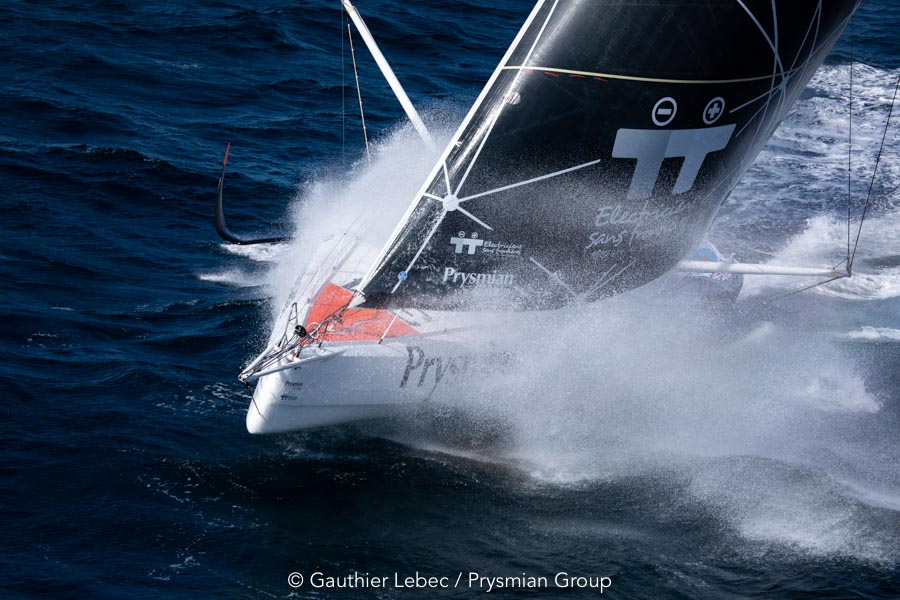The IMOCA Prysmian Group focuses on INCLUSIVE energy
Categories:
Prysmian Ocean Racing
Having already carried out some large-scale projects providing populations in Senegal, Togo and Madagascar with access to electricity during the Vendée Globe and, more recently, the Rolex Fastnet Race, Prysmian Group, the global leader in the energy and telecom cable systems industry, and Electriciens sans frontières, an inclusive international NGO battling to combat inequality in terms of access to electricity and water around the globe, are launching a new operation within the context of the Transat Jacques Vabre Normandie Le Havre. Continuing with their ‘1 click = 1 metre’ approach on Prysmian Ocean Racing team’s social networks, led by Giancarlo Pedote, support this time is being targeted around the Centre de Formation Professionnelle (Professional Training Centre) in Birkelane, Senegal.
“Energy is a fantastic lever for human and economic development. Without access to electricity, it’s hard to take care of oneself, to access high-quality water, to study, to initiate economic activity or even keep roads safe”, explains Hervé Gouyet, President of Electriciens sans frontières, an NGO which primarily works in remote rural locations that are often very poor and most at risk from the effects of global warming or humanitarian catastrophe. “Over the past few years, Electriciens sans frontières has completed more than 120 projects a year worldwide, designed around electrification and/or providing access to water. To successfully carry out these projects, it is essential that it is able to rely on a team of 1,300 volunteers and their various skills, together with key support from companies within the electricity sector. For several years, Electriciens sans frontières has been able to rely on the support of Prysmian. Our joint mission involves improving access to energy for all”, he says. Their next project? Providing support to the Professional Training Centre in Birkelane, in Senegal. “This public training body is keen to train up young girls and boys aged 15 to 24, so that they can obtain the necessary certification to install photovoltaic solar panels with accreditation from the Republic of Senegal’s Ministry of Vocational Training, Apprenticeship and Crafts”, Hervé tells us, emphasising the fact that in the Birkelane department and the wider Kaffrine region, just 12.2% of households have access to electricity. “The Professional Training Centre already has a training system of reference, the aim being to create then supply the necessary educational material to teachers and students”, continues the President of ESF.
A two-pronged campaign
This campaign has a two-pronged goal. Firstly, it aims to provide support for the development of photovoltaic expertise for two teachers from the Professional Training Centre through a theory and practice-based complement to their studies based on renewable energies, followed by the creation of a hybrid and solar installation network and a school site. This is further boosted by the redevelopment of training rooms and workshops through the creation of mobile solar kits and the installation of training panels. “This operation is part of a development project. It’s all down to satisfying key needs. Access to electricity and water helps to respond to the challenges related to food, education, sanitation and security, as well as social, economic and environmental needs”, explains Giancarlo Pedote, the skipper of the 60-foot IMOCA in the colours of Prysmian Group and Electriciens sans frontières who will line up this Sunday at 12:27 UTC for the start of the famous Transat Jacques Vabre in Le Havre. A port in north-east France, students in year two of a vocational training certificate in the city’s Jeanne d’Arc college are working alongside the NGO to get this project up and running. “These students will make two educational solar kits and six panels for training, assembly and cabling practice in the centre’s electricity training room in Birkelane. Once they’ve completed the creation of educational material, this will then be sent out to Africa in a container”, continues Hervé Gouyet, where the aim will be to help to develop a training network in the domain of photovoltaic energy, reduce unemployment by making youngsters much more employable and also boost the economy through actions in the energy sector and the electrification of the Birkelane department.



